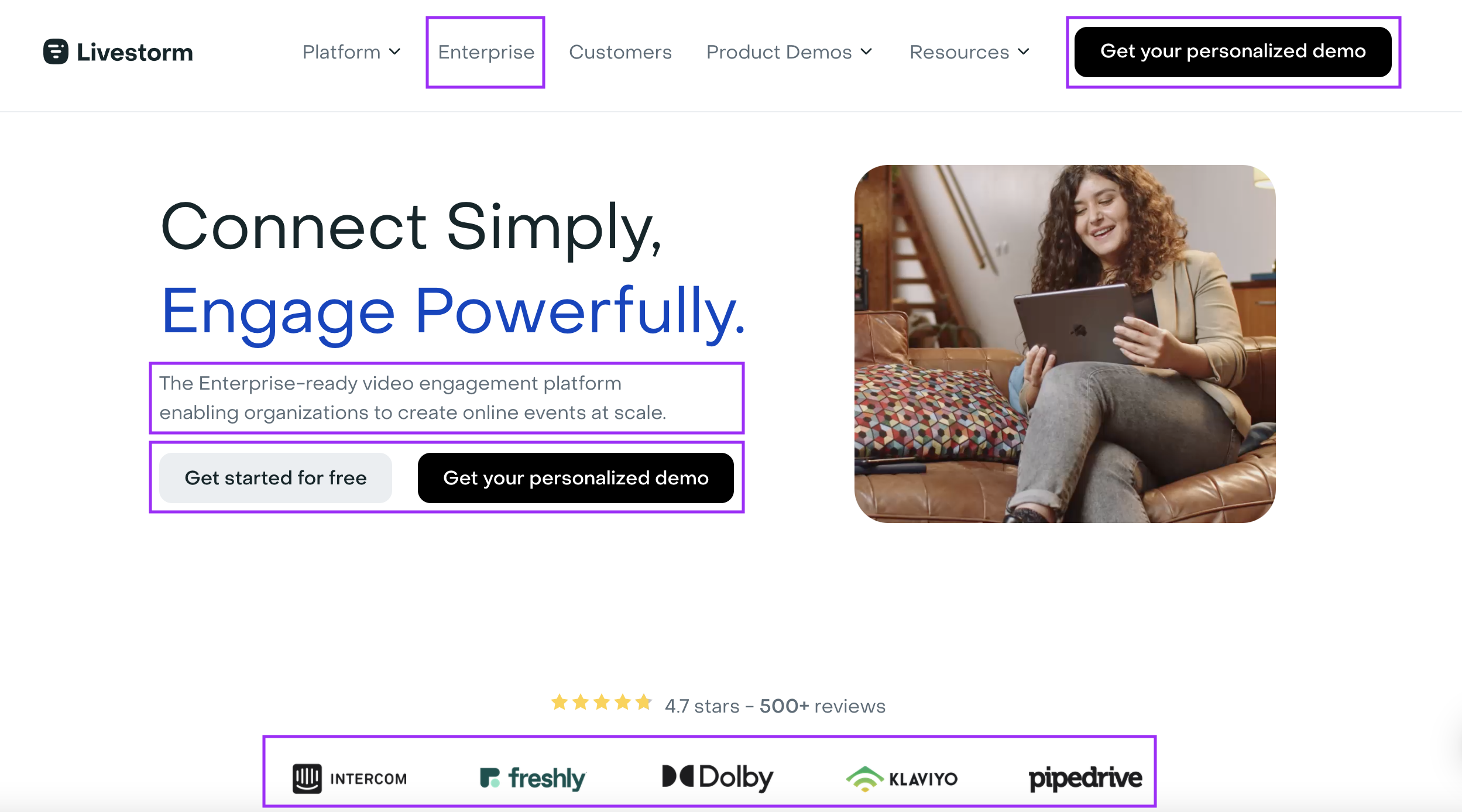- Product
- Content
- Customers
- Company
1:1 ABM personalization made easy
See how ABM teams use Mutiny to engage target accounts at scale.
Want more examples like this?
Browse dozens more proven playbooks from other B2B marketers.
What you’ll learn
- How to approach segmenting your self-serve and enterprise visitors
- How to create LinkedIn ads that are segmented by company size
- How to personalize your top website pages by company size
What you'll need
- CRM data to identify your cutoff point of self-serve vs. enterprise
- A web personalization platform
- A chat bot with segmentation capabilities
The Problem
Starting as Livestorm’s Growth Lead as a global pandemic was getting underway meant Benoit Leggieri entered the world of video communications technology as workplaces everywhere were about to depend on it. That unprecedented interest quickly made the company realize that a new approach was needed.
Historically, the company had operated exclusively under a self-serve model. But Livestorm found themselves faced with a dilemma: despite their larger needs, enterprise companies continued signing up for smaller individual or mid-market plans. Once those customers had anchored to that smaller price point, the sales team found it difficult to move them into larger commitments.
As needs grew during the pandemic, Benoit wanted to take advantage of the building interest and face that challenge head-on. He hoped to grow Livestorm's sales funnel in a way that would focus the sales team’s energy on nurturing their highest-potential leads. At the same time, he didn’t want to lose out on smaller self-serve opportunities either. As Benoit explains:
“During that crazy year, we realized that we needed to start thinking more about enterprise companies. So we brainstormed a sales-enabled funnel to bring more enterprise visitors directly to the sales team for bigger deals and a larger impact on the business.”
The Hypothesis
By segmenting leads across the funnel (everywhere from ads to landing pages), they could personalize the experience of both enterprise and self-serve visitors while focusing the team’s resources on selling larger enterprise deals.
A sales-enabled stream would be focused on enterprise leads. A self-serve option would allow mid-market opportunities to move themselves through the sales funnel independently.
The Solution
Define your segments
Benoit collaborated with management, sales, and the rest of the growth team to analyze Livestorm’s historical sales data to figure out which companies would qualify for their enterprise vs. self-serve audience targeting.
His goal: to figure out the most natural cut-off point that would separate sales-enabled enterprise opportunities from self-serve mid-market leads. The team found a cutoff in company size that made sense based on won and lost deals, then confirmed the segmentation with the sales team.
Segment traffic across acquisition channels
Benoit knew that he would need to segment both organic and paid traffic and surface relevant content and CTAs across the funnel. On the acquisition front, he implemented two strategies:
He upped Livestorm’s SEO game, ensuring their site contained keywords for both self-serve and enterprise prospects
He introduced segmentation on social channels
“Let's take LinkedIn as an example. Since we were able to target based on company size, we were able to diversify our ads with different ad copy and assets. We could have two assets running at the same time for the two different audiences.”
Here’s are some examples of Livestorm’s LinkedIn ads, targeted for enterprise and self-serve.
Personalize your landing page content
Now that Livestorm was segmenting traffic at the top of the funnel, Benoit needed a way to show relevant messaging on the website. For that, he turned to Mutiny.
“We use Mutiny to personalize our top landing pages. We segment based on industry and company size to provide relevant copy and CTAs. For enterprise visitors, for example, we personalize copy around how Livestorm has features specifically built for enterprise companies.”
Here’s an example of Livestorm’s personalized homepage:
Offer different calls to action
Enterprise leads are asked to book a demo with the sales team, offering the sales team an early opportunity to engage. Self-serve visitors, meanwhile, can watch a recorded demo.
“Providing an on-demand demo in webinar format is a quick win that brings a lot of value to the prospect while also saving time for our sales reps, allowing them to focus on the biggest deals.”
Either segment is able to try out Livestorm for free. But while self-serve visitors can link directly to pricing, all prices remain hidden for enterprise companies. This lets Livestorm’s sales team personally position those larger deals, so that prospects’ viewpoints aren’t skewed by comparisons with self-service pricing
Expand the strategy to more channels
Once the team started to see results from their company size personalization on the website, they decided to expand the same principles to their chat strategy. Using Intercom, they built a custom bot that prompted self-serve visitors to register for their demo webinar, while enterprise visitors received a set of questions for further qualification and engagement.
THE IMPACT
By shifting their approach and focusing on separating enterprise and self-serve journeys, Benoit and his team were able to take advantage of growing interest during the pandemic and direct enterprise customers towards the tools designed specifically for them. In doing so, Livestorm improved their enterprise conversion rate and expanded their sales team by 5x in a year and a half.
On the website, Benoit also drove a 27% lift in demos booked for enterprise visitors and a 78% lift in new user sign ups for mid-market visitors. Down Funnel, enterprise ACV increased significantly.
“Creating consistent experiences and messaging across the entire funnel has transformed the way we operate not just for marketing and growth, but sales, product, and customer success. We’ve been able to drive more conversion to exceed our revenue goals for both our self-serve and enterprise audiences.”
Next playbook
Learn from Thomas Maremaa at Brex how to write CTAs to match a visitor's stage of funnel, and remove cognitive friction to get visitors to take action.





